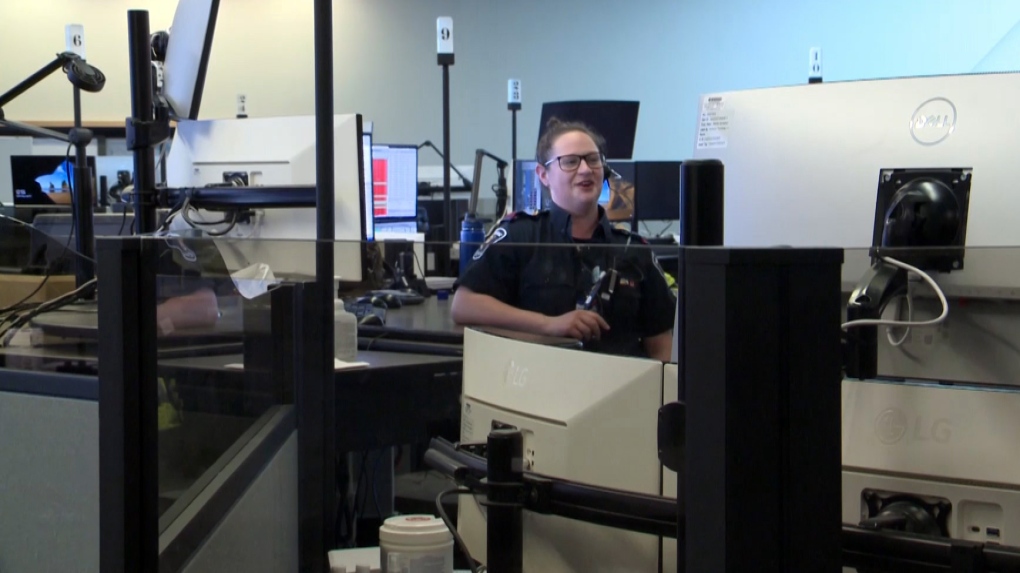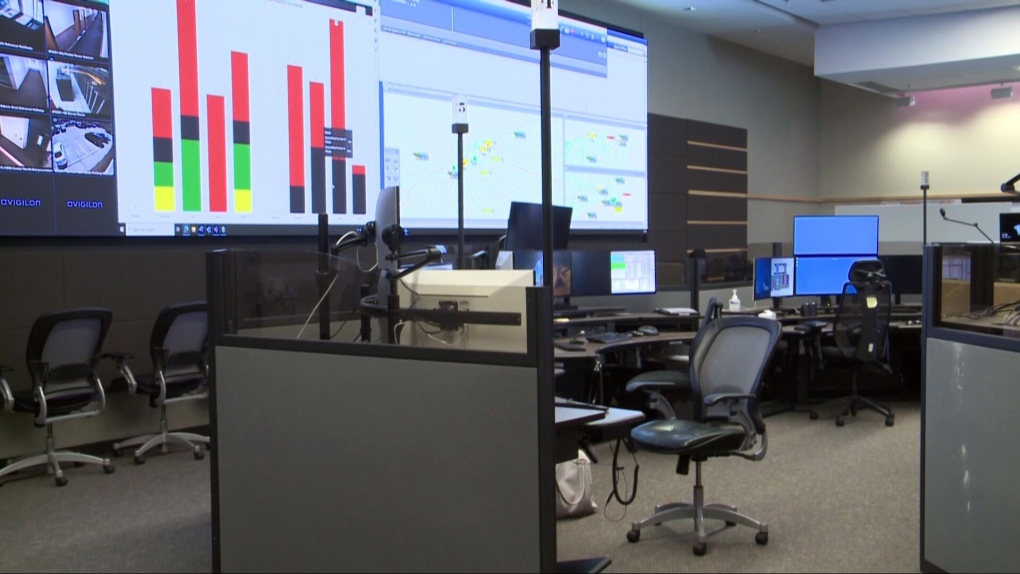Ottawa paramedics launch new 9-1-1 ambulance dispatch system
Ottawa's ambulance dispatchers are using a new system for dispatching emergency medical responses on Wednesday, designed to more accurately triage calls and improve response times for life-threatening emergencies.
The Ottawa Central Ambulance Communications Centre launched the new 'Medical Priority Dispatch System' (MPDS) overnight, a medical call triage and decision support tool that "improves the assignment of paramedics," according to the city.
"This new decision support tool will assist our communication officers in assigning the paramedic resources to 9-1-1 calls," Ottawa Paramedic Service Chief Pierre Poirier said. "MPDS is very good at assessing the severity of patient illness or injury. Paramedics will be dispatched immediately for high-acuity patients experiencing life-threatening events such as a heart attack, unconsciousness, breathing problems and severe allergic reactions."
The 'Medical Priority Dispatch System' will rank calls within five levels of severity, allowing dispatchers to better determine what resources are needed and when. The emergent and immediate life-threatening calls will be classified as "code purple," while the least severe calls will be classified as "code green" for non-urgent, not serious and no immediate threat to life calls.
- Sign up now for our daily CTV News Ottawa newsletters
- The information you need to know, sent directly to you: Download the CTV News App
"Essentially, the old system only had two codes. This new system has five different color codes, and it is much better at determining life-threatening events and also determining what isn't a life-threatening event. So that we can better manage our resources to get to the patient in a timely manner," Poirier said.
"The highest priority call code is called purple, that's been determined by the province, that'll be a very small percentage of the calls we receive. So the purple calls may be somewhere between 2 and 5 per cent of all the calls that we do. Whereas the old system, our highest priority designation, 77 per cent of our calls were considered highest priority. So it really is a much more effective and efficient tool, whereas the old tool was a very blunt instrument."
Paramedics say when someone calls 9-1-1 to request emergency medical assistance, they will be asked more detailed questions designed to help dispatchers gather specific information about a patient's condition to make effective dispatch decisions.
"There is one thing that is very important is that for those individuals who are calling 9-1-1 to know, the call questioning will be different and not just that it will be different, that it just may be more specific, and there may be more questions. So please be patient with our ambulance communications officers because they are trying to get the best service to you as a patient in the most timely manner," said Poirier.
"MPDS can successfully identify patients in life-threatening situations, such as a cardiac arrest, unconsciousness or a stroke, who require an immediate response," the city said in a statement. "Patients who have a non-life-threatening presentation may receive a delayed response from paramedics. Delaying the response for some patients is safe and clinically appropriate."
 A 9-1-1 operator at the dispatch centre in Ottawa, Ont. on April 10, 2024. (Leah Larocque/CTV News Ottawa)
A 9-1-1 operator at the dispatch centre in Ottawa, Ont. on April 10, 2024. (Leah Larocque/CTV News Ottawa)
The old Dispatch Priority Card Index used by Ottawa paramedics only had two triage levels. A report says that 77 per cent of 9-1-1 calls placed to the Ottawa Central Ambulance Communications Centre in 2023 were triaged by the system as 'Code 4' response. However, after a paramedic assessment on the scene, only 12 per cent of those calls required emergency transport to hospital with lights and sirens, according to paramedics.
A coroner's inquest into the death of Ottawa resident Alice Martin in 2005 recommended that the Ministry of Health "immediately take steps" to implement the new 'Medical Priority Dispatch System' in Ottawa.
"The Ottawa Paramedic Service has been advocating with the province for the implementation of MPDS in Ottawa for more than 20 years," Poirier said. "We believe MPDS has a greater level of precision, accuracy and efficiency compared to the current system."
When it comes to "level zero" events in the city, Poirier says it can help, but isn't the entire solution.
"Indirectly, it will help with level zero because it'll give us the ability to better manage our paramedic resources that are out in the community so that they will be available for those highest priority calls. Will it solve the problem? Absolutely not. There's many factors that go into level zero, including the offload delay, our actual call volume, those kind of determinants."
But Poirier believes this can help deliver better care in our city.
"I absolutely believe that will improve the care to our community. And because we're better able to ascertain the medical presentation and whether or not something is life threatening- is really important to us."
The city of Toronto implemented the Medical Priority Dispatch System in 1992. The system was expanded to the Niagara Region in 2007. It was expanded to communication centres in Mississauga in 2022 and Kenora in 2023.
--With files from CTV News Ottawa's Leah Larocque.
Must Watch
Top Videos
CTVNews.ca Top Stories

LIVE UPDATES Here's the latest on the most destructive fire in L.A. County history
A series of wildfires are tearing through densely populated parts of the Los Angeles, Calif. area. Five people have been reported dead. About 130,000 have been asked to evacuate. Nearly 2,000 homes and other buildings have been destroyed after the fires charred about 108 square kilometres.
2 min ago
NEW | Multiple Chinese warships track Canadian HMCS Ottawa through the South China Sea
The silhouettes of a hulking Chinese Navy destroyer dubbed 'Changsha' and a warship called the 'Yuncheng' can been seen hovering along the horizon, mirroring HMCS Ottawa’s movements.
45 min ago
'True when I said it, true today': former Canadian PM Harper pushes back against Trump on social media
Former prime minister Stephen Harper doesn’t find U.S. president-elect Donald Trump’s jibes about Canada becoming the 51st U.S. state very amusing.
UPDATED | Canadian travellers now require an ETA to enter U.K. Here's what to know
Starting Jan. 8, Canadians visiting the U.K. for short trips will need to secure an Electronic Travel Authorization (ETA) before boarding their flight, according to regulations set out by the U.K. government.
20 min ago
Cape Breton police ask for public's help in finding Justin MacDonald's remains
Police in Cape Breton are asking for the public’s help in finding the remains of a missing man they believe was murdered.
3 hours ago
NEW | Winnipeg man charged with sexually assaulting children at daycare: police
Police have charged a man with sexually assaulting two children at an unlicensed daycare in Winnipeg.
15 min ago
Billy Crystal, Paris Hilton among celebrities whose homes were destroyed in L.A. wildfires
Paris Hilton, Adam Brody and Billy Crystal were among the celebrities who lost their homes in the devastating wildfires that swept through Los Angeles.
2 hours ago
Canada could impose tariffs on U.S. steel, orange juice in response to Trump threat
Canadian officials are narrowing a list of American products to target in the event the federal government must respond to U.S. tariffs on Canadian goods, CTV News has confirmed.
NEW Tipping guide to Canada: When, where and how much to tip for restaurants, taxis and more
CTVNews.ca has created an entirely unofficial guide to tipping in Canada to help visitors, newcomers and curious Canadians navigate the shifting social norms of when, where and how much to tip.























































